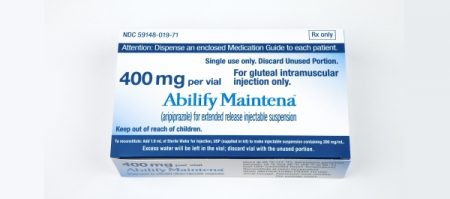Atypical Antipsychotic Drug Aripiprazole Appropriate for Pregnancies
 A 2017 systematic review in the Journal of Affective Disorders found that the atypical antipsychotic medication apripiprazole (Abilify) was relatively safe for use during pregnancy and lactation. Researcher Alessandro Cuomo and colleagues reviewed 93 articles from the last two decades of research.
A 2017 systematic review in the Journal of Affective Disorders found that the atypical antipsychotic medication apripiprazole (Abilify) was relatively safe for use during pregnancy and lactation. Researcher Alessandro Cuomo and colleagues reviewed 93 articles from the last two decades of research.
Placebo-controlled research on medications used during pregnancy are uncommon, due to ethical reservations about assigning women randomly to each group when their fetus may be affected. However, Cuomo and colleagues were able to find some large prospective studies and large database studies that shed light on aripiprazole’s safety during pregnancy. They concluded that the data on aripiprazole during pregnancy and breastfeeding were “relatively reassuring” and that the benefits of aripiprazole outweigh the potential risks.
Risks of relapse upon discontinuing a mood stabilizer can be as high as 80%. Illness in the mother conveys risks to the fetus, so the risk-benefit ratio may suggest that staying on effective aripiprazole treatment during pregnancy and lactation makes sense for many patients.
In a comment on the study reported by Reuters Health, Dr. Jennifer L. Payne of the Johns Hopkins School of Medicine said, “The main reason to discontinue aripiprazole for pregnancy…would be if it is not working and the mother is actively ill, or if she insisted on doing so. In my mind, the literature supports the use of aripiprazole during pregnancy in mothers with serious mental illness who are responding well to the medication.”
FDA Approves Extended-Release Aripiprazole Injected Monthly to Prevent Manic and Mixed Episodes in Bipolar I
In 2017 the US Food and Drug Administration approved a monthly injectable form of the atypical antipsychotic drug aripiprazole, Abilify Maintena, for the prevention of manic and mixed episodes in bipolar I disorder. The intramuscular injections are available for monotherapy in preparations of 300 mg or 400 mg. Maintena did not prevent depressive episodes.
Maintena is already FDA-approved for the treatment of schizophrenia and Tourette’s syndrome in adults.
The approval for bipolar I disorder follows a 52-week phase 3, double-blind, placebo-controlled randomized trial. Participants were experiencing a manic episode during screening for the study, met the criteria for bipolar I disorder, and had had at least one prior manic or mixed episode severe enough to require treatment.
Compared to placebo, Maintena in once-a-month injections delayed the recurrence of any mood episode following the initial manic episode at screening. When the researchers separated their analysis based on type of episode, Maintena reduced manic and mixed episodes compared to placebo, but did not do a better job than placebo at preventing depressive episodes.
An oral antipsychotic must be administered for 14 days following the first injection of Maintena. The extended-release injection is available as 300 mg– or 400 mg–strength powder that may be reconstituted, or as prefilled syringes.
Editor’s Note: Because Maintena is delivered as a once-a-month injection, it may be helpful for patients who struggle to take daily oral medications.
Aripiprazole (Abilify) Now FDA-Approved to Decrease Irritability in Children with Autism
In a recent study, children 6-12 years old with autism were treated with aripiprazole and showed improvement in irritability. The study lasted 52 weeks and had an open-label flexible-dose design (ranging from 2-15 mg/day) with an average dose of 9.6 mg/day. Few discontinuations occurred due to adverse effects, suggesting that aripiprazole is generally safe for use in this patient cohort. Increase in weight gain was the reason seven subjects (2%) discontinued the drug, although weight gain appeared to plateau with continued treatment.
Aripiprazole is already FDA-approved for the treatment and prevention of mania in adults and children (10-17 years). It is also approved as an adjunct (add-on) to poorly effective antidepressants in adults with unipolar (non-psychotic) major depression.
EDITOR’S NOTE: The general safety and tolerability of aripiprazole for the treatment of irritability in children with autistic disorder in this study means the drug can be added to the list of potential treatments for patients with autism. Previously, only risperidone had shown strong placebo-controlled data for efficacy in autism. A study by Hollander published in Neuropsychopharmacology this year indicated that valproate was also significantly better than placebo in treating irritability in children with autism spectrum disorders.


